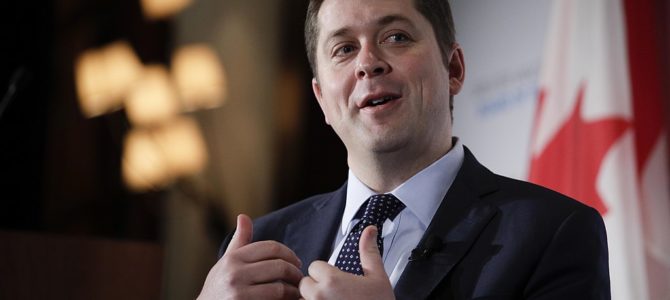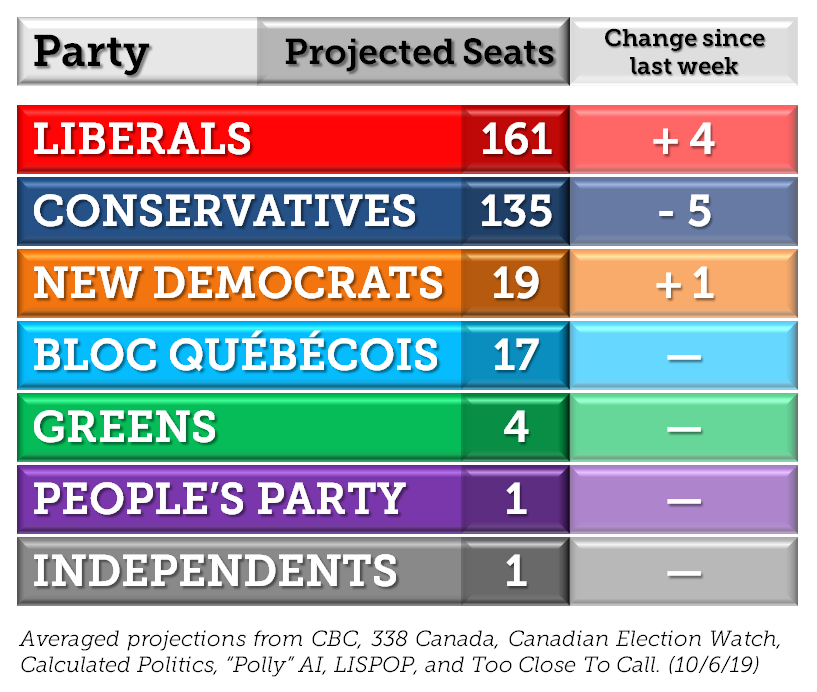
Two weeks remain until we’ll know if Canadians have voted out Prime Minister Justin Trudeau, or if his Liberal Party has managed to even gain seats in parliament. The first 27 days of the official election season has seen its share of scandals as well as signs of movement in the numbers. Here’s where things stand in the 2019 Canadian federal election race.
Debates Offer Opportunities to Damage Trudeau
Beyond any additional late-breaking news or scandals, two planned events have the chance to upend what has morphed into a relatively stable race. Nanos Polling believes 12 percent of Canadian voters remain undecided. If Nanos’ numbers are correct, the debates may be pivotal to Conservative hopes of regaining momentum and Liberal hopes of pushing into majority government territory.
For the first time, all party leaders who have a reasonable chance of winning seats in parliament will be present to square off in two televised debates this week. Unlike a recent TVA debate that catered to voters in Quebec, this week’s debates will feature Green Party leader Elizabeth May and People’s Party leader Maxime Bernier in addition to Justin Trudeau (LPC), Andrew Scheer (CPC), and Jagmeet Singh (NDP). They’ll be available on multiple platforms, and translated live into English, French, Italian, Cantonese, Mandarin, Arabic, Punjabi, Plains Cree, Inuktitut, Eastern Cree, Ojibway, American Sign Language, and Quebec Sign Language.
Monday’s English language debate (7 p.m. to 9 p.m. ET) promises to be a high-stakes battle. With the race still hanging in the balance, all candidates will be looking for an opening, or even a “knock-out” blow. As prime minister and the current frontrunner, Trudeau will likely face attacks from all sides of the debate stage. Scheer may well face criticism from the right courtesy of Maxime Bernier, who left the Conservative Party after a controversial and disputed nomination process.
Tonight’s debate will cover affordability, indigenous issues, leadership in Canada and on the world stage, polarization, human rights, and immigration. The final debate, held on Thursday, October 10 (8 p.m. to 10 p.m. ET), will be conducted in French and cover finances, foreign policy, immigration, identity, ethics, governance, and service to citizens.
Due to their importance to Canadian voters, economic issues as well as debate over environmental and energy policy will be covered on both nights. Both debates will be live-streamed on YouTube by CTV and Global News.
Trudeau’s Main Rival Is…American?
In a fascinating turn, Canadians found out that the main challenger to unseat Justin Trudeau as PM is a man who holds dual American-Canadian citizenship. Although Conservative Party leader Andrew Scheer was born in Ottawa, Ontario—Canada’s capital city—his father, Jim, was born in the United States. As such, Scheer has legal citizenship in both nations.
Nothing bars a Canadian from becoming prime minister if he or she is also the citizen of another nation. Scheer began the process of renouncing his American citizenship in August. When questioned by the Canadian media why he had never disclosed it beforehand, Scheer responded that “he was never asked.” Scheer pointed out that the fact that he has two parents from different nations is something he shares with “millions of Canadians.”
Opponents on the left have ceased upon the opportunity to attack the Conservative leader for what they believe is a “lack of transparency.” The salvos aimed at Scheer for his dual-citizenship have been paired with an accusation that he didn’t fully complete a course in insurance training, raising questions about the accuracy of his pre-parliamentary resume. Scheer responded that he did, in fact, eventually receive the proper accreditation.
For some Canadians, the intrigue over Scheer’s insurance broker credentials is much-ado-nothing. Yet Trudeau and the Liberals are hoping the issue fits into a larger narrative painting Scheer as opaque and “dodgy.”
Environmental Issues Move to the Forefront
The environment has become the number one issue to Canadian voters in October’s election, something hard to imagine 20 years ago. A gender gap remains, however, in the intensity Canadian voters feel about the issue. Fifty percent of women believe that all levels of Canadian government—local, provincial, and federal—are failing to properly address environmental concerns. Less than a third of Canadian men feel the same way.
The issue of the environment provided Scheer with the opportunity to land the only real “zinger” in last week’s Quebec-focused TVA debate at the expense of Trudeau. While Trudeau was busy claiming the mantle of environmental protector and stewardship of the earth, Scheer called him a “hypocrite on the environment.”
“There’s only one Leader here tonight who has two planes for his election campaign,” Scheer told Trudeau, “one for you and the media and another for your costumes and your canoes.” The Conservatives are milking the line for all it’s worth, using it as the centerpiece in a new spot, part of their “Justin Trudeau: Not As Advertised” series.
Trudeau Campaigns to Ban ‘Military-Style’ Rifles
Part of Trudeau’s campaign against gun ownership, the PM seeks to ban all AR-15s and other so-called “military-style” assault rifles. Trudeau is promising to spend $250 million to buy back the more approximately 60,000 AR-15s and similar rifles currently in the country in the possession of law-abiding gun owners.
The Toronto Sun’s Brian Lilley reports there has been only one instance of an AR-15 being used to perpetrate a crime in the more than 50 years the gun has been legal in Canada. As such, Trudeau’s crusade against the AR-15 appears to be based far more on political posturing than on any objective facts or reality.
Liberals Continue to Gain in the Latest Seat Projection
The past seven days were not kind to the Conservative Party, although they remain well within striking distance of the Liberals. In an update to my polling aggregation, I’m now incorporating the predictions of Hill + Knowlton Strategies and Advanced Symbolics Inc.’s “Polly” AI, which uses social media data to predict voter intentions.
This week’s average of seat projections from 338 Canada, Canadian Election Watch, Calculated Politics, Too Close To Call, “Polly” AI, LISPOP, and the CBC predicts a minority government for Trudeau’s Liberals.

Despite the overall positive numbers for the Liberals, a Trudeau victory is by no means a “done deal.” The tipping-point 905 area of Ontario remains up in the air and the Conservatives proved to be quite strong there in the 2018 Ontario provincial election.
Finally, the results of a recent poll of over 1,500 Canadians showed only 25 percent thought Trudeau should get a second term. Whether Scheer and his Conservatives can capitalize on the Canadian public’s weariness with Trudeau remains to be seen.









